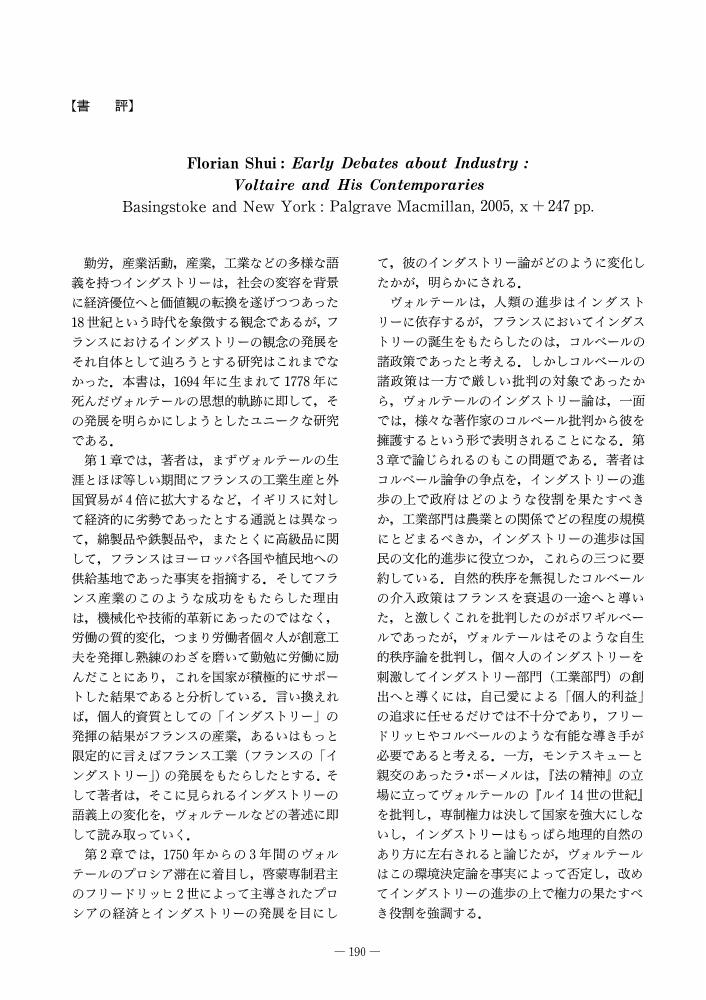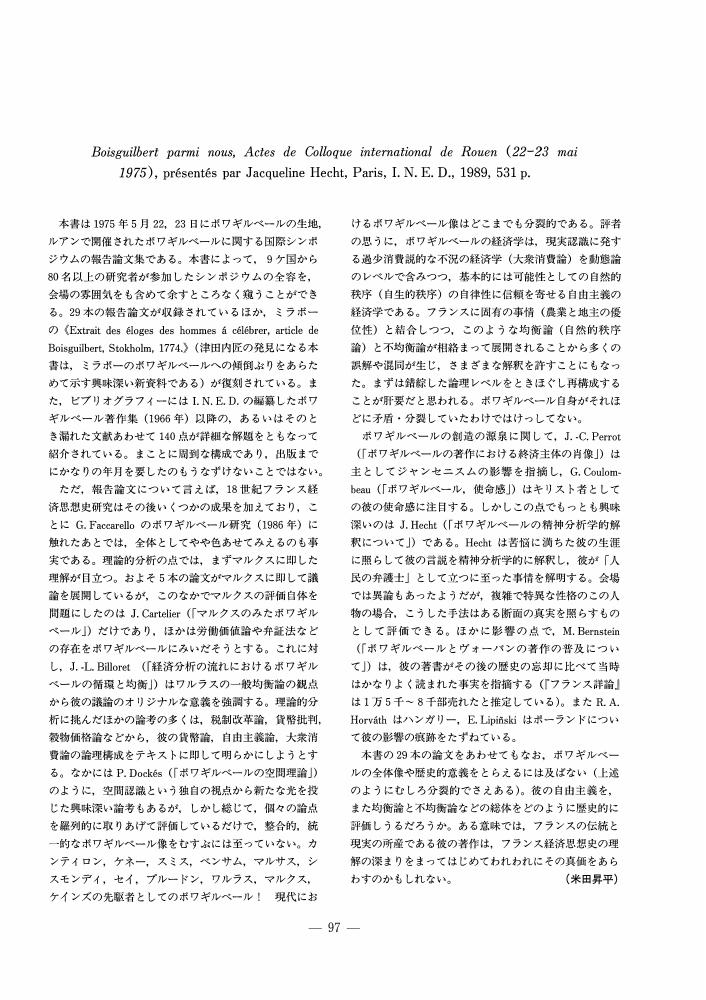3 0 0 0 OA 経済学の起源とアウグスティヌス主義 17 世紀後半のフランス思想を中心に
- 著者
- 米田 昇平
- 出版者
- 経済学史学会
- 雑誌
- 経済学史研究 (ISSN:18803164)
- 巻号頁・発行日
- vol.51, no.2, pp.68-83, 2009 (Released:2019-08-08)
- 参考文献数
- 41
1 0 0 0 OA 渡辺輝雄「ボード―の奢侈論」
- 著者
- 渡辺 輝雄 Robert Chapeskie 米田 昇平
- 出版者
- The Japanease Society for the History of Economic Thought
- 雑誌
- 経済学史研究 (ISSN:18803164)
- 巻号頁・発行日
- vol.61, no.2, pp.40-77, 2020 (Released:2020-02-26)
1 0 0 0 OA 中川辰洋『カンティヨン経済理論研究』日本経済評論社,2016 年,298 頁
- 著者
- 米田 昇平
- 出版者
- 経済学史学会
- 雑誌
- 経済学史研究 (ISSN:18803164)
- 巻号頁・発行日
- vol.59, no.2, pp.195-196, 2018 (Released:2019-10-12)
1 0 0 0 OA Liana Vardi, The Physiocrats and the World of the Enlightenment Cambridge University Press, 2012
- 著者
- 米田 昇平
- 出版者
- 経済学史学会
- 雑誌
- 経済学史研究 (ISSN:18803164)
- 巻号頁・発行日
- vol.56, no.1, pp.138-140, 2014 (Released:2019-08-24)
- 著者
- 米田 昇平
- 出版者
- The Japanease Society for the History of Economic Thought
- 雑誌
- 経済学史研究 (ISSN:18803164)
- 巻号頁・発行日
- vol.49, no.2, pp.100-101, 2007-12-25 (Released:2010-08-05)
- 著者
- 米田 昇平
- 出版者
- The Japanease Society for the History of Economic Thought
- 雑誌
- 経済学史研究 (ISSN:18803164)
- 巻号頁・発行日
- vol.49, no.1, pp.190-191, 2007-06-30 (Released:2010-08-05)
1 0 0 0 OA 奢侈論争と経済学
- 著者
- 米田 昇平
- 出版者
- The Japanese Society for the History of Economic Thought
- 雑誌
- 経済学史学会年報 (ISSN:04534786)
- 巻号頁・発行日
- vol.35, no.35, pp.72-83, 1997 (Released:2010-08-05)
- 参考文献数
- 19
The Luxury controversy caused by the defense of luxury in Mandeville's The Fable of the Bees exerted a great influence on 18th Century France through Melon and Voltaire. This controversy highlighted the coming of “the era of economy, ” and was closely related to the shaping of economics. This paper focuses on a phase of the luxury controversy primarily by examining Forbonnais's theory of luxury and consumption.Forbonnais defines luxury as the desire for a higher level of consumption. Luxurious wants/consumption serve a double economic function; both creating labor incentives and regulating levels of production by stimulating consumption demand. According to Forbonnais, civilized societies are able to progress due to the ubiquitious presence of luxurious wants/consumption. Contrary to this view, Hume, Turgot, and Smith stress saving rather than luxurious wants as the driving force of economic growth.
1 0 0 0 OA ケネー以前のフランス経済学
- 著者
- 米田 昇平
- 出版者
- The Japanese Society for the History of Economic Thought
- 雑誌
- 経済学史学会年報 (ISSN:04534786)
- 巻号頁・発行日
- vol.33, no.33, pp.122-129, 1995 (Released:2010-08-05)
- 参考文献数
- 57
- 著者
- 米田 昇平
- 出版者
- The Japanese Society for the History of Economic Thought
- 雑誌
- 経済学史学会年報 (ISSN:04534786)
- 巻号頁・発行日
- vol.30, no.30, pp.97, 1992 (Released:2010-08-05)
- 著者
- 米田 昇平
- 出版者
- The Japanese Society for the History of Economic Thought
- 雑誌
- 経済学史学会年報 (ISSN:04534786)
- 巻号頁・発行日
- vol.26, no.26, pp.35, 1988 (Released:2010-08-05)
1 0 0 0 IR 18世紀フランス経済学の展開 : ボワギルベール, カンティロン, ケネーを中心に
- 著者
- 米田 昇平
- 出版者
- 一橋大学
- 雑誌
- Study series
- 巻号頁・発行日
- vol.46, pp.1-88, 2001-03-30








